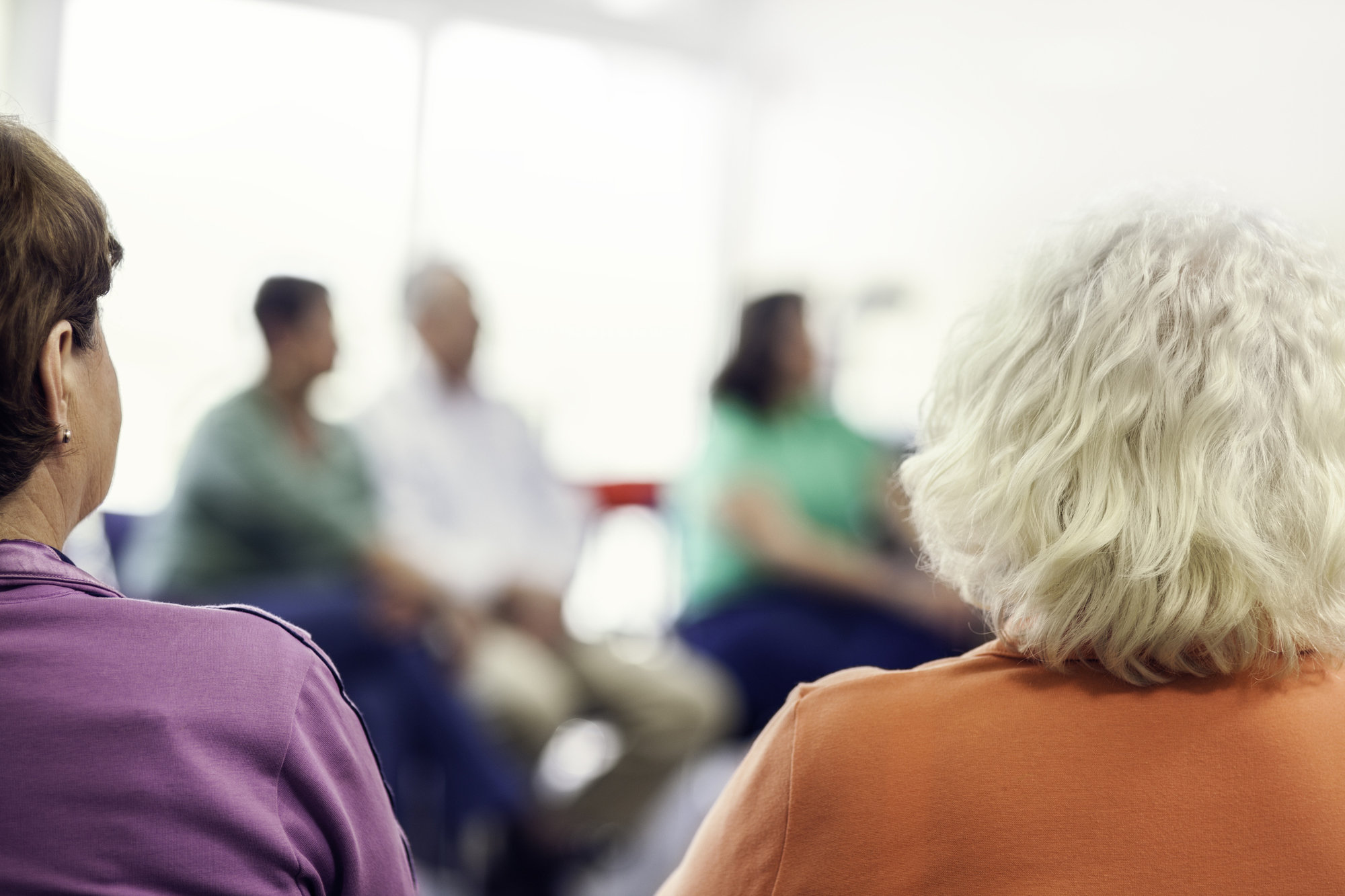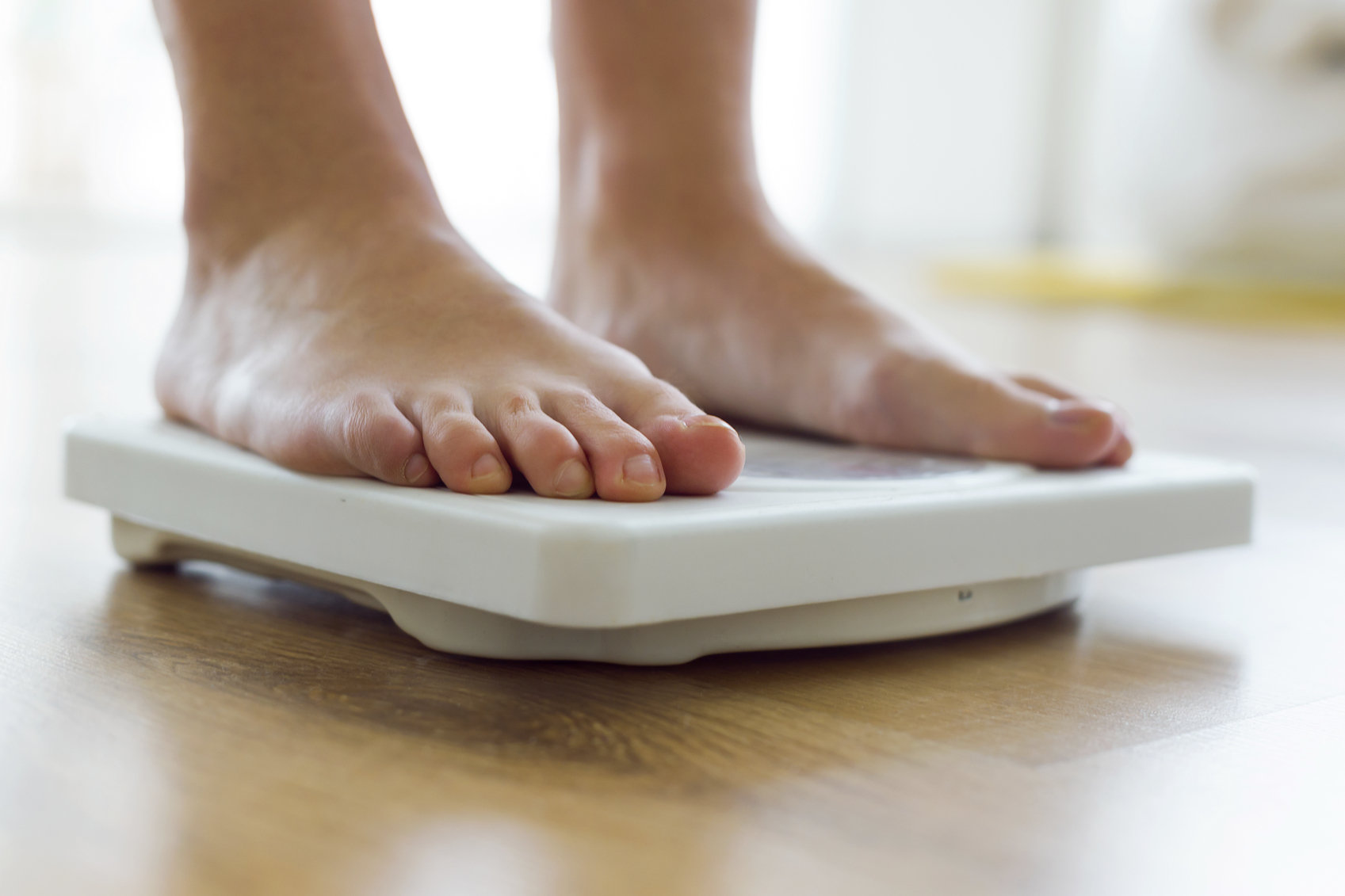It wasn’t always like that. There was a time when the tapes that would play in my head were positive, hopeful, gentle. But that seems like a lifetime ago. At what point down the road of my recovery did things change? I entered Overeaters Anonymous five years ago for a few reasons, but here is the most important one — there were times when I wanted to stop eating, but I couldn’t. I wasn’t choosing to continue or deciding a donut was no big deal or saying “eff your beauty standards.” Something inside me was screaming to stop and I gagged it with whatever food I could get my hands on. And the minute I realized what I was doing, I knew it was affecting everything in my life. It was numbing me out, making intimacy with my husband impossible, leaving me checked out at work. I had become an irritable, reactionary creature who spent her days in white-knuckled panic and evenings in catatonic oblivion. Food was a constant crutch. The second dose of bad medicine was the concept of abstinence. Obviously, one can’t abstain from food like an alcoholic abstains from booze, but some people choose to cut out certain food items, or all food between meals. While working the first few steps in the program, I was asked to cultivate my own idea of what abstinence looks like. Since I felt my eating had become more mindless and less in tune with biological need, all I really wanted to do was be able to eat when I was hungry and stop when I was full. Recovery from food obsession was exhilarating, bringing with it a freedom I had never before felt around food. But somewhere along the way, it was simply replaced by another obsession: weight-loss as a metric of success. The numbers game wasn’t just in my head. In meetings, others would list how much weight they had lost. They would count abstinent days. They talked about measured food plans. My eating was never “perfect.” I could not string more than a few weeks of abstinence together. The only numbers I could confidently advertise were my four years in recovery and my 50-pound weight-loss. And then suddenly, I stopped losing weight. It was exactly like a roller coaster screeching to a halt because by then, it really had become a thrill ride. I was high off my ass on weight-loss. That’s when I started scrambling. This was a distressing time. My program was basically my religion and I was having a full-on existential crisis. I kept asking why it stopped working, unable to see that wasn’t the case at all. I just stopped losing weight. And with no critical reason to lose more, I was beating my head against the wall for nothing. After a particularly enlightening week, I told my sponsor I was ready to give up my weight obsession. If this was the weight I was going to be, that would be OK. After a pregnant pause, she said, “Great! But if you keep doing what you’re doing, I think you’ll still lose the weight.” With that, I said thank you and goodbye to OA. I’m now working a different program around my eating disorder, one that excludes talking about numbers and abstinence or any form of rigidity. My recovery is exciting and invigorating again, and as for my weight, I couldn’t tell you. I haven’t stepped on a scale in 124 days. That’s one number I don’t mind counting. National Eating Disorders Awareness week is February 26 through March 4. If you suffer from obsessive food thoughts and behaviors that are impacting your life, visit nedawareness.org for more information.



title: “Here S Why I Left Overeaters Anonymous” ShowToc: true date: “2024-09-30” author: “Robert Cuzco”
It wasn’t always like that. There was a time when the tapes that would play in my head were positive, hopeful, gentle. But that seems like a lifetime ago. At what point down the road of my recovery did things change? I entered Overeaters Anonymous five years ago for a few reasons, but here is the most important one — there were times when I wanted to stop eating, but I couldn’t. I wasn’t choosing to continue or deciding a donut was no big deal or saying “eff your beauty standards.” Something inside me was screaming to stop and I gagged it with whatever food I could get my hands on. And the minute I realized what I was doing, I knew it was affecting everything in my life. It was numbing me out, making intimacy with my husband impossible, leaving me checked out at work. I had become an irritable, reactionary creature who spent her days in white-knuckled panic and evenings in catatonic oblivion. Food was a constant crutch. The second dose of bad medicine was the concept of abstinence. Obviously, one can’t abstain from food like an alcoholic abstains from booze, but some people choose to cut out certain food items, or all food between meals. While working the first few steps in the program, I was asked to cultivate my own idea of what abstinence looks like. Since I felt my eating had become more mindless and less in tune with biological need, all I really wanted to do was be able to eat when I was hungry and stop when I was full. Recovery from food obsession was exhilarating, bringing with it a freedom I had never before felt around food. But somewhere along the way, it was simply replaced by another obsession: weight-loss as a metric of success. The numbers game wasn’t just in my head. In meetings, others would list how much weight they had lost. They would count abstinent days. They talked about measured food plans. My eating was never “perfect.” I could not string more than a few weeks of abstinence together. The only numbers I could confidently advertise were my four years in recovery and my 50-pound weight-loss. And then suddenly, I stopped losing weight. It was exactly like a roller coaster screeching to a halt because by then, it really had become a thrill ride. I was high off my ass on weight-loss. That’s when I started scrambling. This was a distressing time. My program was basically my religion and I was having a full-on existential crisis. I kept asking why it stopped working, unable to see that wasn’t the case at all. I just stopped losing weight. And with no critical reason to lose more, I was beating my head against the wall for nothing. After a particularly enlightening week, I told my sponsor I was ready to give up my weight obsession. If this was the weight I was going to be, that would be OK. After a pregnant pause, she said, “Great! But if you keep doing what you’re doing, I think you’ll still lose the weight.” With that, I said thank you and goodbye to OA. I’m now working a different program around my eating disorder, one that excludes talking about numbers and abstinence or any form of rigidity. My recovery is exciting and invigorating again, and as for my weight, I couldn’t tell you. I haven’t stepped on a scale in 124 days. That’s one number I don’t mind counting. National Eating Disorders Awareness week is February 26 through March 4. If you suffer from obsessive food thoughts and behaviors that are impacting your life, visit nedawareness.org for more information.



title: “Here S Why I Left Overeaters Anonymous” ShowToc: true date: “2024-10-08” author: “Raymond Delatrinidad”
It wasn’t always like that. There was a time when the tapes that would play in my head were positive, hopeful, gentle. But that seems like a lifetime ago. At what point down the road of my recovery did things change? I entered Overeaters Anonymous five years ago for a few reasons, but here is the most important one — there were times when I wanted to stop eating, but I couldn’t. I wasn’t choosing to continue or deciding a donut was no big deal or saying “eff your beauty standards.” Something inside me was screaming to stop and I gagged it with whatever food I could get my hands on. And the minute I realized what I was doing, I knew it was affecting everything in my life. It was numbing me out, making intimacy with my husband impossible, leaving me checked out at work. I had become an irritable, reactionary creature who spent her days in white-knuckled panic and evenings in catatonic oblivion. Food was a constant crutch. The second dose of bad medicine was the concept of abstinence. Obviously, one can’t abstain from food like an alcoholic abstains from booze, but some people choose to cut out certain food items, or all food between meals. While working the first few steps in the program, I was asked to cultivate my own idea of what abstinence looks like. Since I felt my eating had become more mindless and less in tune with biological need, all I really wanted to do was be able to eat when I was hungry and stop when I was full. Recovery from food obsession was exhilarating, bringing with it a freedom I had never before felt around food. But somewhere along the way, it was simply replaced by another obsession: weight-loss as a metric of success. The numbers game wasn’t just in my head. In meetings, others would list how much weight they had lost. They would count abstinent days. They talked about measured food plans. My eating was never “perfect.” I could not string more than a few weeks of abstinence together. The only numbers I could confidently advertise were my four years in recovery and my 50-pound weight-loss. And then suddenly, I stopped losing weight. It was exactly like a roller coaster screeching to a halt because by then, it really had become a thrill ride. I was high off my ass on weight-loss. That’s when I started scrambling. This was a distressing time. My program was basically my religion and I was having a full-on existential crisis. I kept asking why it stopped working, unable to see that wasn’t the case at all. I just stopped losing weight. And with no critical reason to lose more, I was beating my head against the wall for nothing. After a particularly enlightening week, I told my sponsor I was ready to give up my weight obsession. If this was the weight I was going to be, that would be OK. After a pregnant pause, she said, “Great! But if you keep doing what you’re doing, I think you’ll still lose the weight.” With that, I said thank you and goodbye to OA. I’m now working a different program around my eating disorder, one that excludes talking about numbers and abstinence or any form of rigidity. My recovery is exciting and invigorating again, and as for my weight, I couldn’t tell you. I haven’t stepped on a scale in 124 days. That’s one number I don’t mind counting. National Eating Disorders Awareness week is February 26 through March 4. If you suffer from obsessive food thoughts and behaviors that are impacting your life, visit nedawareness.org for more information.


